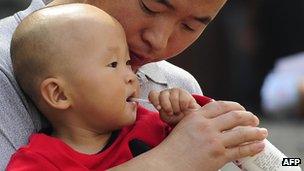Dutch government to probe export of milk formula to China
- Published

A series of food safety scandals in China have created a distrust of local brands
The Dutch government is investigating a shortage of certain brands of baby formula, as well as potentially illegal exports of the products to China.
However, the Dutch Economic Affairs ministry said there was no national shortage in the country.
Tainted milk scandals in China have created distrust of local brands, with families willing to pay a premium for foreign brands.
Hong Kong, Australia and the UK have set limits on the sale of baby formula.
"I want to gather information... over the bulk buying and trade in the Netherlands in order to inform Chinese authorities that they are getting batches of milk powder that do not conform to their regulations," Deputy Economic Affairs Minister Sharon Dijksma said in a statement.
"There is sufficient milk powder available (in the Netherlands), but not always the required brand," she added.
Ms Dijksma said producers in the Netherlands had promised to boost output.
'Melamine scandal'
According to the Dutch Food Industry Federation director Philip den Ouden, there was a 50% jump in sales of infant formula this year, compared to last year.
That did not correspond with the number of births in the Netherlands.
An initial probe showed demand was growing in China. Observers say a 2008 scandal where the industrial chemical melamine was found in baby formula is driving the demand for foreign brands.
Six children died as a result of the tainted formula and more than 300,000 were made ill.
Therefore, foreign brand milk powder sells for a huge premium in China. This has resulted in bulk buying of baby formula from other countries to sell for profit in China.
To counter this, other countries including Hong Kong and the UK have taken steps to limit the number of cans of baby formula customers can buy in a given day.
- Published1 March 2013
- Published8 April 2013
- Published8 January 2013